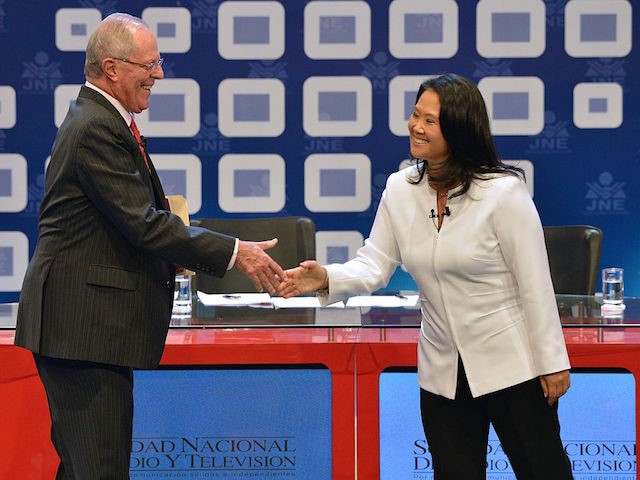On Sunday, French voters cast both the left and right establishment parties of their country out of the running for the presidency, opting instead for a choice between the populist right and a former socialist now selling himself as the safe bet.
On May 7, National Front leader Marine Le Pen will face off against Emmanuel Macron, a former finance minister who left his Socialist Party for a coalition he calls “En Marche!”, and a rebrand as the “French Obama.” On the table are a stable economic, the complete eradication of terrorism, and a fight for the heart of the nation.
If this run-off feels familiar, it is because a similar story played out an ocean away during a 2016 election – not in the United States, but in Peru, where the conservative Keiko Fujimori faced off against center-right career banker Pedro Pablo Kuczynski for the top job.
Peru, like France, has a run-off system that triggers an election between the top two candidates if no presidential contender earns more than 50 percent of the vote in the first round. In 2016 – after five years of left-wing rule under former president Ollanta Humala – Peruvians made clear they wanted to steer the country rightward. Much like France, the leftist candidates failed to gain enough traction to enter the run-off stage, leaving Fujimori and Kuczynski to present competing visions for the country.
In Keiko Fujimori, Peruvians would have elected a politician much like Le Pen. Fujimori’s party, Popular Force, promised support for Christian and conservative pro-family groups, a strong stance on national security and guerrilla warfare, and a commitment to improving conditions for laborers in agriculture and mining, two of the nation’s largest industries. Support for police and investment in building new prison facilities and better equipping law enforcement were key parts of her platform.
While Fujimori’s promises on national security and commitment to social conservatism may have sounded familiar to Peruvian voters around in the 1990s, like Le Pen, Keiko Fujimori crafted a political image and coherent ideology independent of her father’s. Alberto Fujimori ran Peru from 1990 to 2000, winning the nation’s presidency on a populist ticket with little more than a vow to eradicate Marxist terrorism and the catchphrase “Chino para presidente” (“Chinese man for president” – a term of endearment Fujimori warmed to despite being Japanese-Peruvian) on his platform. He later successfully dismantled the deadly Shining Path terrorist group, expanding his popularity greatly before a precipitous fall that led him to his current state, serving a 25-year prison sentence for corruption and alleged human rights abuses. Among his most brazen actions as president, Fujimori usurped legislative power for national security reasons in what was dubbed the “auto-coup” of 1992, which half of Peruvians still consider to have been necessary.
Jean-Marie Le Pen is no Alberto Fujimori, having never served as head of the French state (though he has run into some comparatively minor legal woes, as well). But much as Keiko’s campaign focused on her escape from her father’s shadow, so too has Marine Le Pen crafted her image not merely independent of her father, but on occasion against it. The Front National of 2017 is far more welcoming to LGBT voters and minorities concerned with Islamic violence than its generational predecessor, and Marine Le Pen has arduously worked to craft a party inclusive of all Frenchmen.
Peruvians ultimately voted against their former first lady, opting instead of Kuczynski, a banker with a globalist pedigree including stints at both the International Monetary Fund (IMF) and the World Bank, who developed a reputation as a “prudent economic manager” and dismissed Fujimori as having “no experience in business.” Like Macron, Kuczynski too served as his nation’s finance minister before running for office, though not within a socialist party. Unlike Macron, Kuczynski ran a campaign in a country that, thanks to Alberto Fujimori, sees terrorism as part of its past, while Macron appears to accept it as part of France’s future. Kuczynski nonetheless appeared softer on terrorism than his rival for what he did during the heyday of the Shining Path: he left the country. “I lived the beginning of the terror as a minister. They hung me in effigy [in Lima] and then I left Peru because it was a dangerous place,” he confessed during the campaign.
Like all comparisons, this one, too, is not perfect – for one, Macron has been historically far to the left of Kuczynski. Peru is also not a nation in which millions feel the need to restore a national identity in the face of a global refugee crisis, as evidenced by Fujimori’s and Kuczynski’s Japanese and German heritage, respectively. France, in contrast, lacks the history of animosity towards the World Bank and IMF that triggered resulting hyperinflation and economic collapse in late 1980s/early 1990s Peru, adding favorability to a candidate on friendly terms with these institutions.
The Peruvian election ultimately became a referendum on the legacy of the Fujimori family, driving a wave of leftist voters to support the center-right banker known as “PPK.” Even with this unorthodox voting coalition, Kuczynski barely won the election, with 50.122 percent of the vote compared to Fujimori’s 49.878 percent. The latest surveys out of France put Macron much farther ahead of Le Pen than that; Reuters claims Macron would have a whopping 28-percent lead if the election were held today. Yet much can happen between today and May 7, and Macron cannot bank on the election becoming a referendum on Le Pen the way the left framed the election of Kuczynski – not after “Brexit,” not after America’s choice of President Donald Trump over his standard issue rivals, and certainly not as a seemingly ceaseless wave of terrorism continues to crash over the nation’s key urban areas.

COMMENTS
Please let us know if you're having issues with commenting.